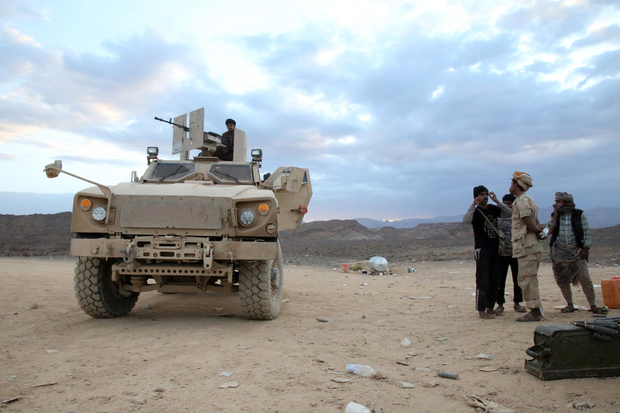The Saudi-led coalition said on Monday that a ceasefire in Yemen would begin the following morning instead of at midnight as earlier announced, as warring parties prepared for talks in Switzerland.
The coalition said the truce would begin at 0900 GMT following a request by Yemeni President Abd Rabbuh Mansour Hadi, but warned that it “reserves the right to respond in case of any violation” by the rebels, said a statement carried by the SPA state news agency.
“The ceasefire [will last] for a period of seven days starting from 15 to 21 December in conjunction with the launch of consultations, and will be renewed automatically in the event of the commitment of the other party,” the statement said.
“Preparations are ongoing for a ceasefire starting Tuesday 9am,” Yemeni Human Rights Minister Ezzeddin al-Asbahi told AFP from Switzerland, where he is part of a government delegation for talks with the Houthi rebels.
Top officers killed
Ahead of the ceasefire, Saudi Colonel Abdullah al-Sahyan and Emirati officer Sultan al-Kitbi died while supervising operations “to liberate” the southwestern Taez province, the coalition said.
Yemen’s presidency described them as “‘martyrs’ who died in an honourable battle,” in a statement that also praised the coalition’s role in supporting “Yemen’s legitimate authority in regaining control of state institutions”.
A Yemeni military source said they were killed when rebels fired a rocket at a coastal road in Taez, which overlooks the strategic Bab al-Mandab Strait through which much of the world’s maritime traffic passes.
Houthi-controlled media also said the two were killed when the rebels conducted a rocket attack on the Red Sea coast.
The attack was a major blow to the Saudi-led coalition, Al Jazeera reported.
Fierce fighting between the Houthis and pro-Hadi forces continued on Monday in the southern Daleh province, witnesses said.
Coalition warplanes bombed late Monday rebel position south of Sanaa, witnesses said.
Rebels ‘cannot be trusted’
Both pro-Hadi forces and insurgent groups have traded barbs over each side’s willingness to stick to the truce.
And there has been no word from Saleh or his General People’s Congress party, which is represented at the Switzerland talks.
The warring sides have agreed to talks despite protracted differences, including over UN Security Council Resolution 2216, which calls for rebels to withdraw from key cities and surrender their weapons.
The government and its Gulf allies say the resolution is a prerequisite for peace.
According to the UN envoy, talks will focus on four main areas, including the terms of a permanent ceasefire and the withdrawal of armed groups from areas they control.
The Houthis, a Zaidi Shia group that has long complained of marginalisation, seized government headquarters in Sanaa in September 2014, several months after advancing from their northern stronghold of Saada.
They later encroached on second city Aden, forcing Hadi into exile in Saudi Arabia.
In November, Hadi returned to Aden and declared it his provisional capital.
Under cover of coalition warplanes and backed by Arab soldiers and heavy weaponry, pro-government forces have recaptured five southern provinces, including Aden, since July.
The coalition has been accused by rights groups of carrying out unlawful air strikes without even conducting investigations into allegations of civilian deaths.
The United Nations says more than 5,800 people have been killed in Yemen, about half of them civilians, and more than 27,000 wounded since March. MEE






 WhatsApp us
WhatsApp us 

